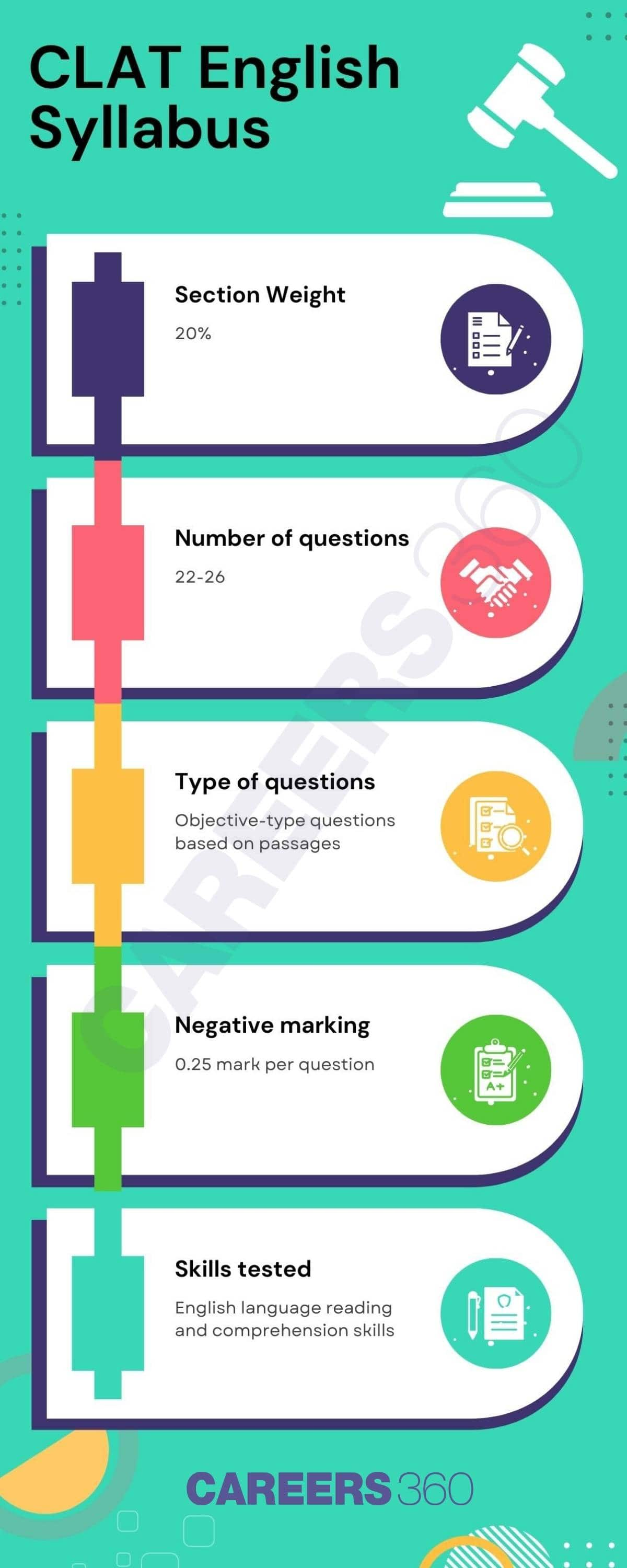Jindal Global Law School Admissions 2026
Ranked #1 Law School in India & South Asia by QS- World University Rankings | Merit cum means scholarships | Early Admissions (Pahse 2) Deadline: 28th Feb’26
The Consortium of National Law Universities publishes the CLAT English syllabus 2027 on the official website - consortiumofnlus.ac.in. The CLAT 2027 English syllabus tests the candidate’s proficiency in the English language and ability to read and comprehend complex pieces of text. In the English section, candidates will be presented with passages of about 450 words each. These passages will be drawn from contemporary or historically significant fiction and non-fiction works, written at a level that a Class 12 student can read within 5 to 7 minutes. The syllabus for CLAT English language carries 20% weightage in the CLAT syllabus 2027. Read on to get all the details of the CLAT English syllabus 2027, including important topics, preparation tips, and more.
This Story also Contains

The Consortium will notify the CLAT 2027 schedule on its official website. Candidates appearing for the exam must carefully go through the CLAT 2027 English syllabus as the CLAT English subject is useful for other sections of the Common Law Admission Test, which is a very reading-intensive exam.
Particulars | Detail |
|---|---|
Section Weightage | 20% |
Number of questions | 22-26 |
Type of questions | Passage-based multiple-choice questions |
Skills tested | English language reading and comprehension skills |

The syllabus for CLAT English language consists of 3-4 passages of approximately 450 words each. The passages in the CLAT 2027 English syllabus are drawn from journalistic and non-fictional sources, which are then followed by multiple-choice questions based on the passages. The CLAT English section has around 22-26 questions. The maximum difficulty level of the CLAT English syllabus 2027 is of class 12 level, as with the rest of the sections in CLAT, except the CLAT Mathematics syllabus, which is of class 10th level.
The type of English asked in CLAT is at the class 12 level. The English section focuses on evaluating the candidate’s ability to comprehend pieces of text drawn from non-fiction and news sources and answer questions based on them.
The English language section in CLAT tests the English proficiency of the candidates. The skills tested in the English section are useful for other sections of CLAT. All the sections in CLAT are reading-intensive and require the candidate to comprehend complex texts and then answer questions based on them. The CLAT 2027 English syllabus tests the following skills in the candidate-
Read and understand the primary idea contained in the passage, and the arguments and opinions expressed in the passage.
Drawing inferences from the given passage
Summarising the extensive text given in the passage
Evaluate and compare various arguments given in the passage
Understand word meanings and phrases within the context presented in the passage
Given below is a list of important topics covered in the CLAT English syllabus 2027-
Synonyms and antonyms
Identifying word meanings and phrases from the passage
Draw inferences and conclusions based on the passage
Summarise the passage
Understand the meaning of various words and phrases in the context in which they are used in the passage
Direct questions based on the information given in the passage
Ranked #1 Law School in India & South Asia by QS- World University Rankings | Merit cum means scholarships | Early Admissions (Pahse 2) Deadline: 28th Feb’26
Among top 100 Universities Globally in the Times Higher Education (THE) Interdisciplinary Science Rankings 2026
Given below are some of the topics covered in the syllabus for CLAT English Language in previous CLAT question papers. It will help candidates assess the level of preparation required for the section.
| Year | Topics | Difficulty Level |
|---|---|---|
| 2025 | The questions in the English section should be answered based on the details that are provided in the passage. It also includes questions on synonyms and antonyms. There are no questions on English grammar usage. | Easy |
2024 | To the point, literature-based questions to be answered based on the information given in the paragraph. No questions on vocabulary. | Easy |
2023 | Drawing inferences and conclusions, identifying sentence meanings in the context of the passage, and vocabulary-based questions | Easy but lengthy |
Candidates can make use of the few quick preparation tips given below to prepare for the English syllabus for CLAT 2027.
A regular reading habit will vastly improve one’s reading speed and ability to understand the given information. It can help candidates get over with the CLAT English section quickly and devote more time to others.
Candidates can refer to flashcards and dictionaries to build vocabulary and boost their word power
Reading newspapers can make a lot of difference to candidates as it will make them comfortable with non-fiction reading and also keep them aware of the latest developments.
Practising with CLAT sample papers is another way to evaluate one’s preparation and take corrective measures for better performance in the actual exam.
Candidates can refer to the CLAT books below to prepare for the CLAT English section. The list is not exhaustive, and candidates can research more books as per their convenience and preference.
Last Date to Apply: 25th Feb | Ranked #18 amongst Institutions in India by NIRF | Ranked #1 in India for Academic Reputation by QS Rankings | 16 LPA Highest CTC
India's Largest University | BCI approved | Meritorious Scholarships up to 5 lacs |
You may also check another subject syllabus:
Frequently Asked Questions (FAQs)
The CLAT syllabus for English consists of passages testing testing the reading comprehension skills of the candidates.
CLAT is a difficult exam due to its low success rate and extensive and reading-intensive syllabus.
No, a thorough preparation for CLAT requires at least a year of preparation. Two months may not be enough to crack CLAT.
On Question asked by student community
Since you have not specified your category, I will answer for all categories. A CLAT rank of 38169 (typically 40-45 marks) makes admission to top NLUs difficult. For General candidates, chances are nil. Even for OBC, SC, and ST categories, admission is primarily possible only through state domicile quotas or
After the CLAT results are declared, candidates participate in a centralised online counselling process managed by the Consortium of NLUs. Eligible candidates register on the official portal, submit their NLU preference list , and pay a counselling fee. Seat allotment happens across multiple rounds based on rank, category, and preferences,
Hi, you can apply for admissions in Nirma University, NFSU Ahemdabad, Alliance, IPU University and affiliated instiutes (in case you are reserved category candidates), UPES Dehradun, BITS Law School etc.
Start preparing for CLAT by first understanding the exam pattern and syllabus, which includes English, Current Affairs, Legal Reasoning, Logical Reasoning, and Quantitative Techniques. Make a simple daily routine and begin with basics read newspapers regularly for current affairs, practice comprehension passages for English and legal sections, and solve basic
Hello,
With a CLAT AIR of 33599 and SC category rank of 2103, and being a Delhi domicile, your chances at IP University (GGSIPU) are moderate to good, especially in later counselling rounds.
Based on previous year trends, some IPU-affiliated law colleges have closed at higher SC category ranks, so
Among top 100 Universities Globally in the Times Higher Education (THE) Interdisciplinary Science Rankings 2026
NAAC A+ Accredited | Among top 2% Universities Globally (QS World University Rankings 2026)
Excellent curriculum; an impressive range of electives, besides core law courses. Up to 100% merit scholarship on a first-come, first-served basis
Moot Court | Mock trials | Legal Aid Clinic
Admissions open for B.A. LL.B. (Hons.), B.B.A. LL.B. (Hons.) and LL.B Program (3 Years) | School of Law, MRU ranked No. 1 in Law Schools of Excellence in India by GHRDC (2023)
NAAC A++ Accredited | Ranked #11 by NIRF